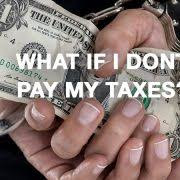On October 29, 2019 we posted The IRS is Now Criminally Prosecuting Employers For Failure To Pay Withheld Payroll Taxes! where we discussed that the IRS is stepping up criminally prosecuting business owners for failing to turn over withheld payroll taxes.
Then on June 4, 2020 we posted Another Employer Gets Criminally Prosecuting For Failure To Pay Withheld Payroll Taxes! and on June 29, 2020 we posted More Employers Gets Criminally Prosecuting For Failure To Pay Withheld Payroll Taxes! and now according to DoJ, the owner of a Greensboro, North Carolina, business owner was sentenced to 42 months in prison on October 6, 2020 for failing to pay employment taxes.
According to documents and information provided to the court, Rebecca Adams, 57, and her daughter Elizabeth Wood, 40, operated a temporary staffing businesses in Greensboro under the names A & R Staffing Solutions Inc., Wood Executive Services Inc., and Adams Staffing Enterprises Inc.
State Taxes From Employees’ Paychecks,
But Did Not Pay Those Taxes To The IRS.
In 2015, Wood pleaded guilty to embezzling employee tax withholdings that were due to the state and was sentenced to prison.
During Wood’s period of incarceration for the state payroll tax fraud, Adams continued to withhold taxes from employees’ paychecks, but did not pay those taxes over to the IRS. Adams also did not file with the IRS a required quarterly payroll tax return.
In addition to the term of imprisonment, U.S. District Judge N. Carlton Tilley Jr., ordered Adams to serve three years of supervised release and to pay approximately $2,222,834 in restitution to the United States. On June 25, 2020, Wood was sentenced to 18 months in prison for failing to pay over employment taxes, and ordered to pay approximately $2,338,766 in restitution to the United States
Read more at: Tax Times blog












